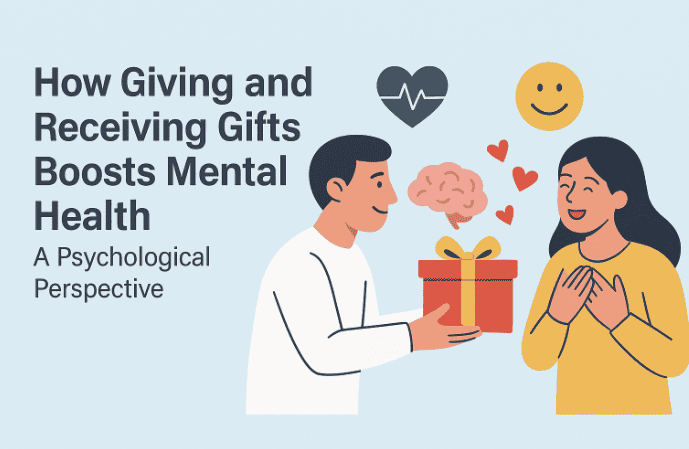Giving and receiving gifts may feel like a simple act of kindness, but behind it lies a fascinating web of psychology. From brain chemistry to emotional bonding, gift-giving has a powerful effect on mental health—for both the giver and the receiver.
Let’s dive into what science says about the emotional benefits of gifting and how this time-honored tradition helps us feel more connected, calm, and happy.

🎯 Dopamine: The Brain’s Natural Reward
Every time we give a gift, especially when it’s unexpected or meaningful, the brain rewards us with a burst of dopamine—the neurotransmitter associated with pleasure, motivation, and satisfaction.
Psychologists have found that giving often brings even more joy than receiving. Why? Because it lights up the brain’s reward system, giving us that “helper’s high” similar to what people experience after volunteering or doing good deeds.
Even thinking about how someone will react to your gift can trigger positive anticipation—and that alone helps boost mood and motivation.
🤝 Oxytocin: Strengthening Human Bonds
When you give or receive a meaningful gift, your brain releases oxytocin, often referred to as the “bonding hormone.” It’s the same chemical our bodies produce when hugging a loved one or sharing emotional moments.
This hormone increases trust and emotional closeness, making gift-giving a powerful tool for relationship-building. Gifts don’t have to be expensive—what matters most is that they feel personal and sincere.
🎁 The Emotional Value of Thoughtful Gifts
Not all gifts are created equal in the eyes of psychology. A thoughtful or personalized gift has far greater emotional impact than something generic or flashy. People tend to remember how a gift made them feel, not how much it cost.
For example, platforms like OnlineGifts.ca offer curated, personalized gift ideas designed to make people feel truly seen and appreciated. Whether it’s a custom care package, a wellness gift box, or a simple note with meaning behind it, these kinds of gifts can make a real difference in someone’s day—and their mental health.

🧠 Mental Health Benefits of Giving and Receiving Gifts
Here’s a look at the key psychological benefits of this exchange:
1. Reduced Stress and Anxiety
Acts of kindness—like giving gifts—help lower cortisol levels, reducing stress and calming the nervous system.
2. Improved Mood and Self-Worth
Being generous boosts feelings of self-efficacy and purpose. It also reminds the receiver that they matter, which can be especially helpful during emotionally difficult times.
3. Enhanced Relationships
Gifts foster trust, emotional intimacy, and a sense of belonging. Even a small surprise can reinforce bonds and boost feelings of connectedness.
4. Increased Gratitude and Joy
Receiving a heartfelt gift often inspires gratitude, which is closely tied to better sleep, reduced depression, and improved emotional resilience.
💡 It’s Not the Size, It’s the Meaning
One of the most common misconceptions about gift-giving is that bigger or more expensive equals better. In truth, the most meaningful gifts are those that reflect thought, understanding, and care.
A handmade item, a book with a personal note, or a simple “just thinking of you” surprise can spark just as much joy as something extravagant.
The goal isn’t to impress—it’s to connect.
🤲 Final Thoughts
Gift-giving is more than a kind gesture—it’s an act rooted in human psychology. It strengthens relationships, boosts mood, and fosters emotional well-being on both sides.
In a world where people are constantly seeking connection, meaning, and reassurance, a thoughtful gift goes a long way.
So the next time you think about surprising someone, know that you’re doing more than being generous—you’re supporting their mental health… and yours too.
🙋♀️ Frequently Asked Questions
1. Is gift-giving good for your mental health?
Yes! Giving gifts triggers dopamine and oxytocin, helping reduce stress and boost overall well-being.
2. What makes a gift psychologically meaningful?
Personalization, emotional relevance, and the intent behind the gift matter more than the cost.
3. Can receiving gifts reduce depression or anxiety?
It can help! Receiving thoughtful gifts encourages feelings of gratitude and belonging, both of which are beneficial for mental health.
4. Why do people feel happier when giving rather than receiving?
Giving creates a sense of purpose, social connection, and activates the brain’s reward system.
5. How often should you give gifts to maintain strong relationships?
There’s no fixed rule, but occasional thoughtful gestures—even small ones—can significantly strengthen bonds over time.


